Compare office rental prices in Ho Chi Minh City for foreign businesses starting a business
- 7:59 am
- admin
How can you understand the complexity of office rental costs?
Can you find the best deal for your budget and needs?
Do you know other office solutions that help you reduce a lot of costs?
Do you have a partner to thoroughly advise your needs? and many more questions…
In this guide, GTax will show you how to find office space that suits your needs in Ho Chi Minh City. The office is not just a place to work. It’s where you create, connect, and deliver value to your customers. That’s where your business grows and thrives. That’s why finding the right office space for your small business is so important.
Discover how to navigate office rental costs in Ho Chi Minh City. Learn the basics, factors influencing the costs, and tips to find the best deals for your small business.
1. Basic concepts of office rental costs
If you’re looking for a place to run your business, you may be wondering how much it costs to rent an office space or building. The answer is not simple, as there are many factors that can affect office rental prices.
Office space cost per square foot
When budgeting for office space, it’s essential to consider the overall picture, the square footage required, the layout, and any other costs, like maintenance or utility fees. By understanding costs per square meter, businesses can make informed decisions, ensuring they get the best value for their investment while still meeting their operational needs.
The cost of office space is often measured on a per-square-foot basis, serving as a standard metric for comparing rental prices across different properties and locations. This cost encompasses not only the physical space but also other factors like location, office quality, available amenities, and market demand.
For instance, spaces in prime business districts or upscale neighborhoods typically command higher rates per square foot due to their accessibility, visibility, and prestige. On the other hand, spaces in suburban or less developed areas may offer more affordable rates.
According to a report by Savills Vietnam, the average rent price for Grade A offices in Ho Chi Minh City was around $22 per square meter (or $2.04 per square foot) in the second quarter of 2022. The average rent for Grade B offices in the same location was about $13 per square meter (or $1.21 per square foot). These prices reflect the high demand and limited supply of office spaces in the city’s central business district.
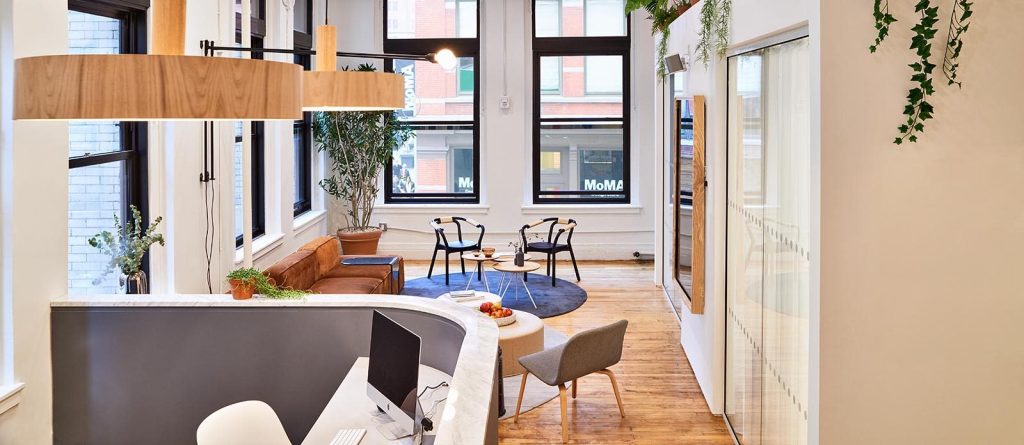
When using GTax’s services, Consultants will help you consider the advantages and disadvantages of each option and advise you on the best solution for your needs.
How to establish a business in Vietnam?
Following are the steps for your reference:
- Decide on the scope of your business;
- Rent a business location;
- Choose company type;
- Decide on the company name and capital structure;
- Apply for Investment Registration Certificate (IRC);
- Apply for Enterprise Registration Certificate (ERC);
- Open a business bank account;
- Complete all post-incorporation requirements.
Factors affecting office rental costs
1. Location
One of the most important factors determining office rental price is its location. Location affects the supply and demand of the building as well as the accessibility and prestige of the area.
In general, offices in central business districts or prime locations are more expensive than offices in suburban or rural areas because they have higher demand, better transportation options, and greater visibility.
For example, according to a report by CBRE, the average office lease price in Ho Chi Minh City is $29 per square meter per month in 2023, while the average office price in Hanoi is $25 per square meter per month in the same period.
2. Building Quality
Building quality is one factor that can affect both the cost of rent and the value of office space. Quality here refers to the age, condition, design, and construction of the office building.
Depending on these elements, office spaces are often classified into three categories:
- Class A: These are the best and most expensive office spaces in prime locations. They have high-quality materials, systems, and amenities and appeal to tenants who want a professional and upscale image.
- Class B: These are functional and comfortable office spaces that meet the standards of most tenants. They are older but well-maintained and have decent amenities and services. They offer moderate prices and flexible lease terms.
- Class C: These are the oldest and cheapest office spaces in less desirable locations. They have poor maintenance, systems, and amenities and cater to tenants who have low budgets or do not need high-quality office space.
Generally, Class A buildings have the highest rents, followed by Class B and Class C buildings. The difference in rent can vary depending on the building amenities, location, and demand for the office space.
For example, according to a report by CBRE Vietnam, the average rent for Class A office space in Ho Chi Minh City is $43 per square meter per month, while the average rent for Class B office space is $25 per square meter per month, and the average rent for Class C office space is $16 per square meter per month in 2023.
3. Amenities
Amenities are features and services that can enhance the experience and value of office space for tenants and visitors.
This is also another factor that can affect the office rental price, which is the included amenities.
Some standard amenities that an office space can provide are:
- Parking: Parking can make it easier for office workers and clients to get to the office space, especially in busy areas. The cost and availability of parking depend on the size and location of the office space. According to Colliers International, the average rent for a monthly parking slot in Ho Chi Minh City is $67 for a car and $6 to $10 for a motorcycle.
- Security: A necessary service for every office space, especially in high-risk areas or with sensitive data. Cameras, alarms, access controls, guards, and other security measures are available, and the cost will largely depend on the type of office and its location. As reported by JLL, Class A office buildings have higher security standards and costs than Class B or C office buildings.
- Internet: A vital utility for every modern business, especially in sectors that need fast and reliable connectivity. Internet services can include broadband, fiber optic, wireless, etc. Internet speed and cost depend on the provider and plan of the office space. According to Speedtest, the average fixed broadband download speed in Vietnam is 70.86 Mbps, while the average fixed broadband upload speed is 66.31 Mbps. The average monthly internet access subscription fee in Ho Chi Minh City is 50 USD to 80 USD for a fiber optic line.
- Cleaning: A service that every office space requires to keep a clean and professional environment. The frequency and cost of cleaning services depend on the size and condition of the office and can include sweeping, mopping, dusting, and sanitizing, among other things. For example, the average monthly salary of a cleaner in Ho Chi Minh is $215.
- Maintenance: A service that every office space needs to maintain its systems and equipment in good order. Maintenance services can include repairing, replacing, upgrading, etc. Maintenance scope and cost depend on the office’s age and quality. A report by Savills Vietnam stated that the average monthly service charge for Class A office buildings in Ho Chi Minh City is $6 per square meter, while the average monthly service charge for Class B office buildings is $4 per square meter.
Depending on your business needs and preferences, you may want to look for office spaces that offer the amenities that suit you best. For example, if you expect to have a lot of clients or employees who drive to your office location, you may want to find an office space that has ample parking spaces or offers discounted parking prices.
However, you should also be aware that some amenities may be included in the base rent, while others may require additional fees or charges. Therefore, you should always check the terms and conditions of your lease agreement carefully before signing it.
Differences in office space costs of major cities compared to neighboring towns
There are many factors that affect the cost of renting an office for your business. You should consider your business goals, budget needs, and preferences before deciding where to rent office space.
1. Large cities (e.g. Ho Chi Minh, Binh Duong)
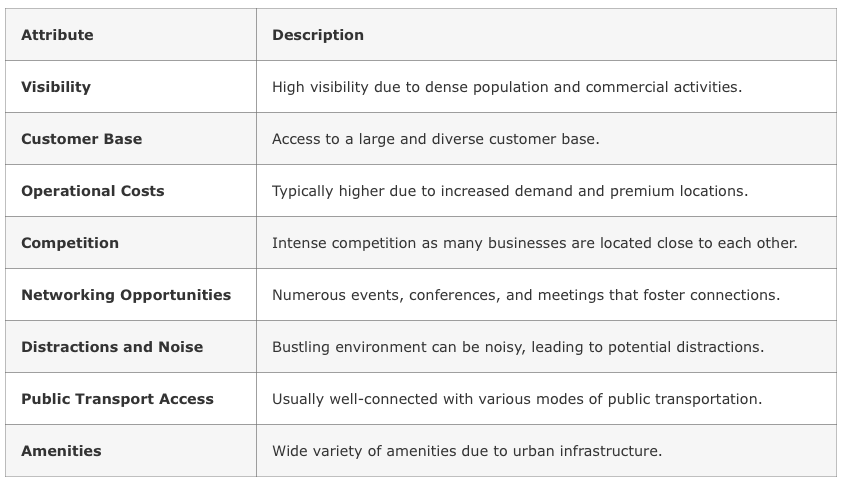
2. Neighboring Towns (e.g., Dong Nai, Long An)
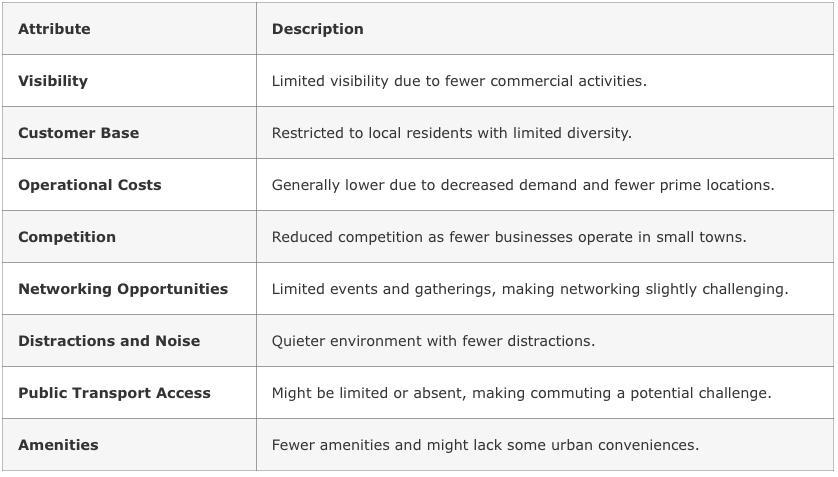
2. Making the Right Choice for Your Business: Office Space vs CoWorking Space?
- Private office space
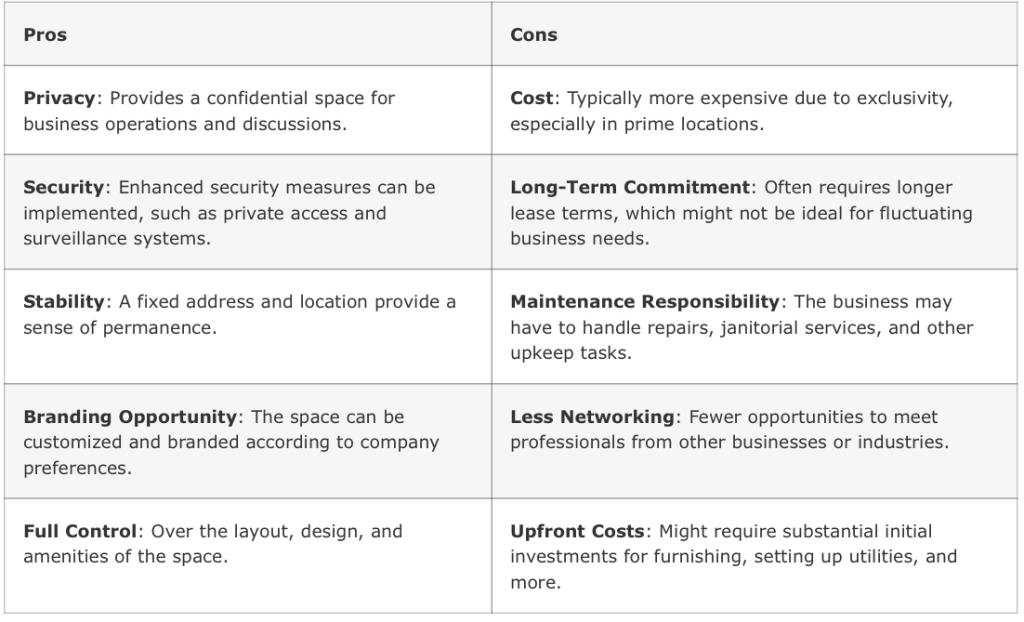
Private office space offers businesses a private and exclusive environment designed specifically for their operations. They are characterized by the privacy, security and stability they provide, ensuring confidential discussions and business operations take place without outside interruption. With dedicated spaces, businesses have complete control over the layout, design and branding of their environment, delivering a consistent and professional image to customers and partners. However, these benefits also come with challenges. Leased offices typically have higher costs, both in terms of monthly rent and potential maintenance responsibilities. Additionally, the commitment to a longer lease term may be restrictive, especially for businesses that can anticipate changing needs
- Coworking Space
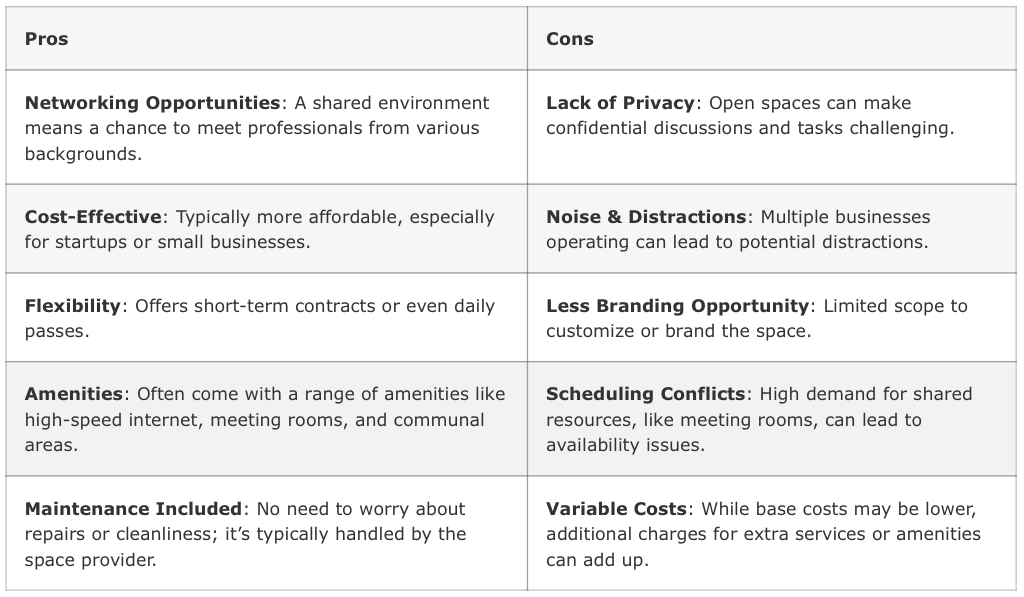
Coworking Spaces provide a dynamic and flexible environment for professionals and businesses. These co-living spaces are cost-effective, making them especially attractive to startups and small businesses with limited budgets. The communal nature of Coworking spaces also promotes networking, providing opportunities for collaboration and innovation. However, a shared environment can sometimes be a double-edged sword. Privacy can be violated and the bustle of activity can cause potential distractions. Furthermore, a lack of personalization can limit a business’s ability to brand and customize its workspace.
3. Which office space should I choose?
1. Business goals
One of the most important factors to consider when choosing between coworking and personal office space is how each option fits with your business goals. Depending on what you want to achieve in the short and long term, you may find that one option is suitable or more beneficial than the other.
For example:
- If your business goal is to scale quickly and expand your team, you may want to rent a coworking office space. Coworking offers are often more flexible and affordable, allowing you to adjust your setup as your business grows. However, traditional offices have longer lease periods and often higher upfront costs, which can pose a challenge when you’re in expansion mode.
- Conversely, if your business goal is to establish a strong reputation and brand recognition, you may prefer office space to coworking. You can design your space to fit your brand values and personality. You can also impress your customers, partners and investors with a dedicated address, phone number and signage. Coworking limits your customization and differentiation options. You may also lose brand consistency and reliability across different locations.
- Additionally, if your business’s goal is to diversify its products, services or markets, you may prefer coworking over office space. Surround yourself with a mix of experts, providing opportunities for collaboration or even just some interesting chats during breaks. On the other hand, with a traditional office, while you have your own space, you may miss out on unexpected meetings that spark creative ideas.
2. Business Needs
Another factor to consider when choosing between coworking and private offices is how each option meets your business needs. Depending on what you need to run your business effectively and efficiently, you may find that one option offers more or less value than the other.
For example:
- If your business needs access to specialized equipment, such as printers, scanners, projectors or video conferencing tools, you may prefer coworking over office space. Coworking offers a variety of amenities and services at low or no cost. You can also share resources and expertise with others. Renting an office means buying or leasing your equipment, which is expensive and time-consuming. You may also have to handle installation, maintenance, and repairs yourself.
- Additionally, if your business needs a lot of storage space for inventory, documents or materials, you may prefer an office space to a co-working space. Renting office space provides more storage and security for your items. You can store your items in a private and locked space that only you can access. You can also arrange your items as you like. Coworking offers limited or no storage space for your items. You may have to bring your belongings with you or rent an external storage unit. You may also be concerned about the safety and security of your items in shared environments.
3. Business Hobbies
The third factor to consider when choosing between a coworking space and an office rental is how each option fits your business preferences. Depending on what you like or dislike about the work environment and culture, you may find that one option is more enjoyable or comfortable than the other.
For example:
- If you enjoy a dynamic and social work environment where you can interact with other businesses or professionals from different industries and backgrounds, you may prefer coworking over office spaces. room. Coworking allows you to interact with many different businesses or professionals from different fields and backgrounds. You can also participate in various events, workshops or programs organized by the community or coworking operator. Renting office space can isolate you from other businesses or professionals. You may also miss out on collaboration, referral, or partnership opportunities that can come from being part of a vibrant community.
- Conversely, if you prefer a quiet and private work environment where you can focus on your tasks without interruption or distraction, you may prefer an office space to work. shared. Renting an office gives you more privacy and peace than coworking. You can work in a private, secluded space to block out any noise or disturbance. You can also set your own rules and boundaries for your space and employees. Coworking can expose you to a lot of noise and activity from other businesses or professionals sharing the same facilities. You may also face a lack of privacy and security in shared environments.
4. Conclusion
With the above analysis, we are sure that you still have some doubts. This is extremely normal. Don’t hesitate to contact us, GTax consultants will support and provide you with more information.
When using GTax’s services, Consultants will help you consider the advantages and disadvantages of each option and advise you on the best solution for your needs.
How to establish a business in Vietnam?
Following are the steps for your reference:
- Decide on the scope of your business;
- Rent a business location;
- Choose company type;
- Decide on the company name and capital structure;
- Apply for Investment Registration Certificate (IRC);
- Apply for Enterprise Registration Certificate (ERC);
- Open a business bank account;
- Complete all post-incorporation requirements.
Source : thesentry – Compiled by GTax Accounting Service

Personal tax rates on other income in Vietnam
Personal income tax is your income through business, salary, wages, inheritance, interest or dividends… Vietnam’s personal income tax rate is calculated based on the type of residence. GTax has

How can I do business in Vietnam without establishing a legal entity?
Starting a company often takes many months, during which time the company is inactive and requires tens or hundreds of thousands of dollars in capital investment, often before understanding the

How to setup a new company in Vietnam
Most foreign investors who want to invest in Vietnam face difficulties in legal procedures to obtain a legal business license. Through this article, GTax will provide you with some basic
-
How To Make Investment In Vietnam
-
Designing Functional Home Offices
-
Setting up a home office: How much does it cost?
-
How to setup a new company in Vietnam
-
Compare office rental prices in Ho Chi Minh City for foreign businesses starting a business
-
Head office registration requirements for newly established companies in Vietnam
-
The difference between a Representative Office and a Foreign Invested Company
-
A step-by-step guide to starting a business in Vietnam
-
What type of business to choose in Vietnam?
-
Forms of business in Vietnam
